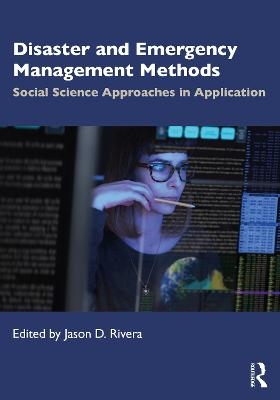
Disaster and Emergency Management Methods
Routledge (Verlag)
978-0-367-42396-4 (ISBN)
The disaster and emergency management contexts have a host of challenges that affect the research process that subsequently shape methodological approaches, data quality, analysis and inferences. In this book, readers are presented with the considerations that must be made before engaging in the research process, in addition to a variety of qualitative and quantitative methodological approaches that are currently being used in the discipline. Current, relevant, and fascinating real-world applications provide a window into how each approach is being applied in the field.
Disaster and Emergency Management Methods serves as an effective way to empower readers to approach their own study of disaster and emergency management research methods with confidence.
Jason D. Rivera is an associate professor in the Department of Political Science and Public Administration at SUNY Buffalo State. He has completed research on all phases of disaster and emergency management using a broad range of methodological approaches and designs as a means of focusing on individual decision-making and behavior. Rivera is also interested in issues related to social equity, governance, and organizational structures, and epistemology. Prior to his arrival at SUNY Buffalo State, Rivera earned his PhD at Rutgers University - Camden in public affairs and worked as a research associate at two different academic institutions - the William J. Hughes Center for Public Policy at Stockton University and the Liberal Arts and Science Institute for Research and Community Service at Rowan University.
Foreword Introduction: Engaging in Research within the Disaster and Emergency Management Contexts Part 1: Preliminary Considerations of Disaster and Emergency Management Research 1. Practical Considerations for Ethical Research in Post-Disaster Communities 2. Sampling in Disaster and Emergency Management Research 3. Disastrous Inferences? The Ecological Fallacy in Disaster and Emergency Management Research 4.Mixed Methods Research in Disaster & Emergency Management 5. Studying Vulnerable Populations in Disaster Part 2: Qualitative and Interpretivist Approaches to Studying Disaster and Emergency Management 6. Interviewing in a Disaster Context 7. Focus Group Research in Disaster and Emergency Management 8. Site Mapping as Participatory Action: A Methodology for Practitioners, Academics, Students, and the Community 9. Language-based Theories and Methods in Emergency and Disaster Management 10. Ethnography without Experimentation: Ethnographic Methods in Post-Disaster Contexts 11. Observation Research in Emergency and Disaster Management 12. Secondary Data and Qualitative Content Analysis in Emergency Management Research Part 3: Quantitative and Policy Approaches to Studying Disaster and Emergency Management 13. Large Secondary Datasets: Imperative for Addressing Global Public Health Disasters 14. A Brief Introduction to Statistical Modeling for Disaster and Emergency Management Research 15. Social Network Analysis for Disaster Management Research 16. Quasi-Experimental Research in the Wild: Walking the Line Between Quantitative and Qualitative 17. Using Historical Institutionalism: FEMA and U.S. Disaster Declarations 18. Mapping Resilience: GIS Techniques for Disaster Studies Conclusion: Understanding Disasters: Questions Should Drive Methods and Other Interdisciplinary Lessons
| Erscheinungsdatum | 28.07.2021 |
|---|---|
| Zusatzinfo | 47 Tables, black and white; 34 Line drawings, black and white; 34 Illustrations, black and white |
| Verlagsort | London |
| Sprache | englisch |
| Maße | 178 x 254 mm |
| Gewicht | 725 g |
| Themenwelt | Naturwissenschaften ► Geowissenschaften ► Geografie / Kartografie |
| Sozialwissenschaften ► Politik / Verwaltung ► Europäische / Internationale Politik | |
| Sozialwissenschaften ► Soziologie ► Empirische Sozialforschung | |
| ISBN-10 | 0-367-42396-0 / 0367423960 |
| ISBN-13 | 978-0-367-42396-4 / 9780367423964 |
| Zustand | Neuware |
| Haben Sie eine Frage zum Produkt? |
aus dem Bereich


